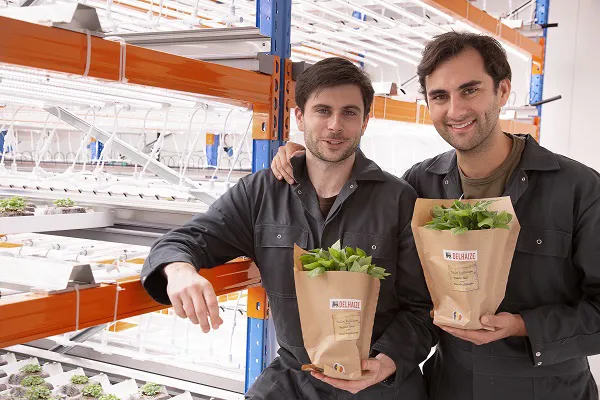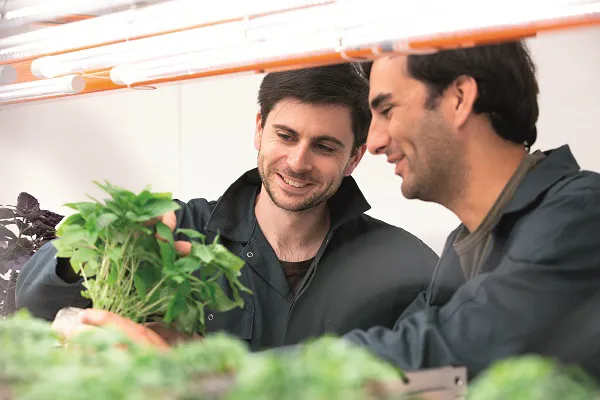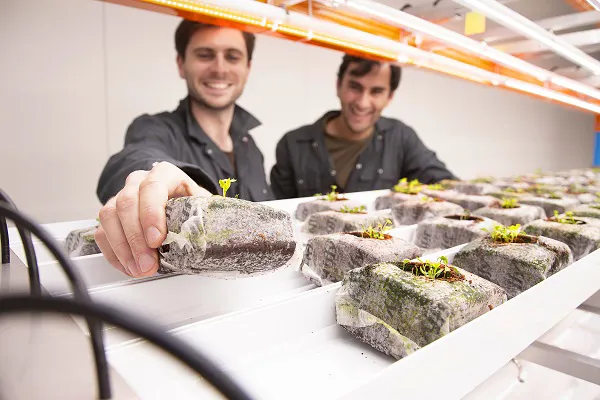Two years ago, business partners, Alexandre Van Deun and Olivier Paulus, opened one of the very first vertical farms for herbs in Brussels, Belgium. Now, the complete classic herb assortment is grown. Not only for local retailers like Delhaize and Aveve, but also for catering companies and restaurants. The farm's current 1,400m2 has become too small. This duo's next step is, therefore, a new 2.5-hectare farm with 15 cultivation layers.

Alexandre Van Deun and Olivier Paulus
Urban Harvest is currently located in an old meat market in the heart of Brussels. “The building was standing empty, and we wanted to grow our products locally, close to the consumer,” says Urban Harvest’s Alexandre. “At the moment, we cultivate on five or six layers in a 1,400m2 farm. We have all the traditional pot herbs in our range and also grow special herbs per client orders. Our clients are always interested in novelties. So we are always busy testing new products and growing techniques to respond to their demands.”

Herbz
“The two largest retailers that buy our herbs are Delhaize and Aveve. Delhaize sells the herbs under their private label, and at Aveve, from May, they will be sold under their house brand, Herbz. The packaging is completely plastic-free, and on it, you can see that the herbs are grown, sustainably, in a vertical farm."
"In stores, there is no surcharge for vertically-farmed herbs. Sustainability is important to consumers, but they will not pay more for a different cultivation method. We deliberately built our system in such a way that we can supply our products at competitive prices,” continues Van Deun.
Flavor and shelf life
Urban Harvest cultivates its herbs on a substrate and, according to Van Deun, this contributes to the herbs’ good flavor and the plant’s resilience. “There are crucial aspects. The flavor must win over consumers, but the herb must also store well. Our herbs can easily last a week in someone’s kitchen,” explains Alexandre. “One of the most difficult herbs to grow is mint. We grow our plants from seeds, but it is almost impossible to find mint seeds. In the business, we mainly work with cuttings, making it hard to find good mint seeds. That is a puzzle we have not yet cracked.”

“Automation equals costs”
Alexandre and Olivier developed the entire vertical farm themselves. “We were busy building the farm for 16 hours a day, seven days a week. We are very proud of that. Once we got four investors, we were ready for the next step,” continues Van Deun. “Our current and new farms are not completely automated. There are plenty of textbook examples of vertical farms that are not fully automated. There are costs involved with automation that people are not prepared to pay."
"That is why we decided to only focus on processes that make sense to automate. We, therefore, retain a measure of human interaction. Harvesting is still done by hand, and being able to control the quality is a considerable advantage of this. A harvesting robot would not be able to do so. In contrast, planting is automated. There are machines that do this perfectly, so why do it manually?”
Fifteen cultivation layers
“We have since burst out of our seams and so, had to go in search of a new location. We will remain in Brussels, with a site that lies adjacent to the channel. We soon want to use the channel to transport raw materials, rather than using road transportation. We are already busy building the new vertical farm at this new location. It will be 2.5 hectares in size, and ten meters tall, so we can grow on 15 layers,” says Alexandre. If all goes to plan, the new farm will be operational in 2021.

Urban Harvest’s owners do see a future in vertical farming but do not believe it will replace ‘normal’ greenhouse cultivation. “It is better to consider vertical farming as a supplement to greenhouse and full soil farming. That is why, nine times out of ten, an idea like a roof greenhouse fails. Why build a conservatory in the middle of a city, on an expensive site? This can easily be done at the edge of town or in the countryside. If something’s production price is too high, there is no sense in investing in it,” concludes Alexandre.
More information:
Alexandre Van Deun
alexandre@urbanharvest.eu
 Urban Harvest
Urban Harvest
www.urbanharvest.eu
